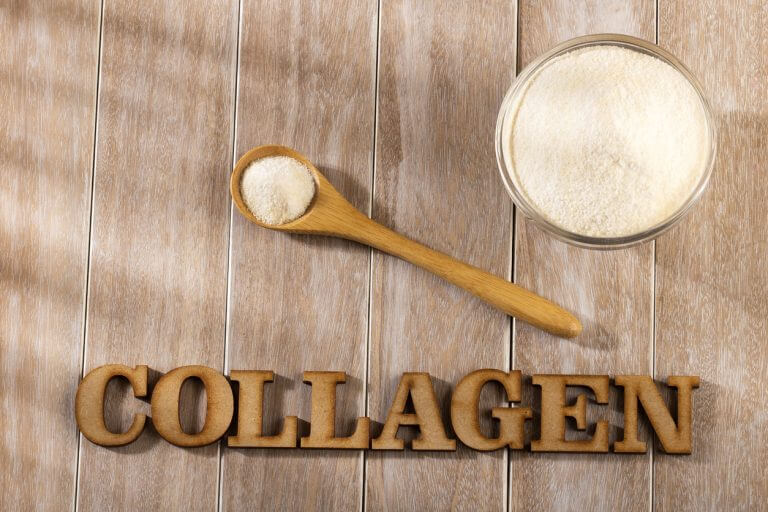From collagen powder and pills to cosmetic treatments, collagen has been a hot topic in beauty and wellness. The hype of collagen should not be dismissed as a fad because it is a protein your own body creates. It has functional benefits for your internal skeletal system and organs, but it also helps you stay looking young, fresh, and strong. Collagen is found in your tendons, fat, ligaments, and many other areas throughout the body. It is the most common protein found in the body and is one of the major building blocks of your body composition. It is often referred to as the glue that holds the many parts of your body together.
Types of Collagen
There are at least sixteen different types of collagen with four main types.
- Type I: This type of collagen is made of densely packed fibers and accounts for ninety-percent of your body’s collagen. It helps provide structure for your skin, bones, tendons, cartilage, connective tissues, and teeth.
- Type II: This type is made of more loosely packed fibers found in elastic cartilage, which helps as a cushion for your joints.
- Type III: This type supports your muscles, organs, and arteries.
- Type IV: This type is found in layers of your skin and helps with filtration.
Collagen Stimulation
While collagen is an amazing protein that can help strengthen your body and help your skin stay youthful, its production decreases with age. A person produces one-percent less collagen each year after the age of twenty. Skin can become thinner and more fragile. Stimulating production of this protein after the age of twenty is vital as it helps maintain your youthful strength and glow.
Day-to-Day Collagen Production Tips
Four of the nutrients that help with collagen production are vitamin C, glycine, copper, and proline.
Vitamin C can be found in:
- Bell peppers
- Strawberries
- Citrus fruits
Copper is found in:
- Sesame seeds
- Cashews
- Lentils
- Cocoa powder
Glycine is found in:
- Pork and chicken skin
- Gelatin
- Protein-rich foods
Proline is found in:
- Egg whites
- Cabbage
- Asparagus
- Mushrooms
Incorporating these into your diet is an easy way to help boost collagen. In addition to these four nutrients, a diet filled with high-quality proteins is an excellent source of amino acids that help with protein production.
What to Avoid
Stay away from sugar and refined carbs as they can interfere with collagen’s ability to repair itself. In addition, smoking has the same effect and can do even more damage to your overall health. Excessive sun exposure can also reduce production and lead to premature wrinkles.
Cosmetic Treatments
For those who want that extra boost of collagen, multiple treatments can give your skin a super boost of this protein. Below you will find some of the most effective cosmetic treatments that help boost production.
Microdermabrasion: There are multiple benefits that the skin can treatment can offer, including improved elasticity, smooth skin, and decreased pore size. Microdermabrasion also stimulates collagen production, which further benefits the youthfulness of your skin.
Laser Treatments: The growth of collagen, elastin, and melanin can all be stimulated through laser therapy. The intense wavelengths of light and ultrasound help invigorate production to help reduce the signs of aging. The benefit of laser treatment is that it is non-invasive with very noticeable skin benefits.
Cosmetic Surgeon in Southern California
Dr. Brent Moelleken is a well-known plastic surgeon with years of experience in plastic and reconstructive surgery. He is one of the most highly trained surgeons in the country and received his training at Harvard, Yale, and UCLA. He has also been selected as one of Vogue Magazine’s “Top 10 Plastic Surgeons in America.” Contact Dr. Brent’s office today for a consultation.




